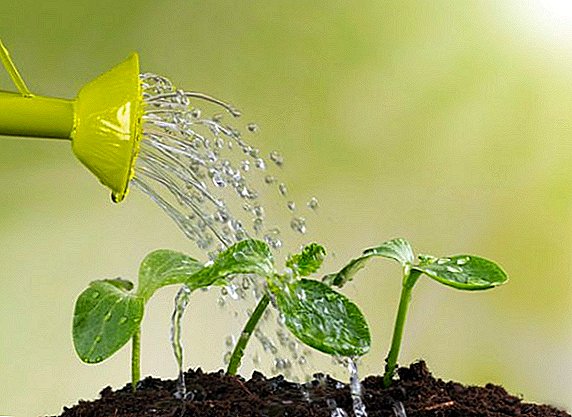 The birth of a calf is an important event for both the cow and the farmer. From this point on, he is responsible for the health of the baby. Unfortunately, there are times when a calf refuses to eat or drink. In this article we will look at the reasons for this and what to do in such a situation.
The birth of a calf is an important event for both the cow and the farmer. From this point on, he is responsible for the health of the baby. Unfortunately, there are times when a calf refuses to eat or drink. In this article we will look at the reasons for this and what to do in such a situation.
Feeding calves
Immediately after birth, the baby’s immunity is still very weak, since its formation has not been completed. Only the stomach section of the abomasum is fully formed in the digestive system, and the rest are at the stage of formation.
All the nutrients, as well as strengthened immunity, are provided by the mother through colostrum feeding. It is very important that the baby eat the first time within an hour after calving.
Important! Boil the mixture for feeding is impossible - the proteins will fold, and it will not be suitable for use.
A healthy young animal should receive one and a half liters of colostrum of the mother during the first feeding. If at once the calf cannot drink such a volume, it is worth giving in small sips.
In the first 2-3 days after birth, the calf should eat about 6 liters of colostrum, and feeding should be carried out 4-5 times a day. About the health of the baby can be judged by a wet nose and a dry tail. After the baby becomes stronger, you can begin to give milk, and then accustom you to drink water from a bucket. 
The calf does not eat: the reasons
Consider the main causes of a calf failure.
The sucking reflex is not developed.
Sometimes the reason for refusal to eat is the insufficient development of the sucking reflex, when the calf does not understand what he needs to do and how to get food. In such a situation, it is necessary to help the baby - direct it to the udder of the cow, and after a couple of feedings, he will remember the process.
In order to make the calf understand where the milk is, it is worth dipping your finger in the colostrum and letting it lick its newborn. He will immediately recognize the taste of milk and understand how to eat it.
Did you know? On the nose of each cow there is a pattern inherent only in this individual, as in humans - a fingerprint.
Unappealing food
Another important reason for not eating is too cold milk. You must ensure that the temperature of the liquid was about + 37 ... +39 ° C. Sometimes it happens that the baby has a loss of appetite due to the fact that he does not like the taste of milk.  In this case, it is recommended to add some substances to it that will make milk more attractive for babies.
In this case, it is recommended to add some substances to it that will make milk more attractive for babies.
In one bottle of milk is to add:
- fish oil - 1 tbsp. spoon;
- chicken egg - 2 pcs .;
- salt - 1 tsp.
Mix the mixture well and give the baby a nipple. To accustom newborns to food is gradually, it is important to observe the animal's appetite and, if the calf begins to eat poorly, immediately use various methods to attract it to food - feeding with the help of a nipple and a finger.
Learn how to choose a good calf when buying.
Got sick
In the first days after birth, the calf is most vulnerable, so the main indicator of its health is a good appetite.  If you refuse to eat, you can assume the following diseases in the animal:
If you refuse to eat, you can assume the following diseases in the animal:
- white muscle disease;
- white diarrhea (is the main symptom of colabitsiloza);
- pneumonia;
- paratyphoid;
- inflammation of the mucous membranes of the stomach;
- hernia.
If you suspect these ailments, you should immediately consult a veterinarian for advice. You should not self-medicate, since only a specialist will be able to establish the right cause and prescribe an effective therapy.
Why the calf does not drink water
It is very important that the bull get enough liquid, as its deficiency in the body can be fatal. If the baby refuses to water for 5 days after birth, then you should not worry. During this period, he drinks mother's milk, and his body may be quite young.
Important! Introducing potatoes into the diet of young stock is possible only upon reaching two months of age. Vegetable must be chopped and peeled.
However, if the maximum in a week, when the baby needs to start eating coarse food, he still does not begin to drink water, it is worthwhile to seriously approach the issue of drinking. 
Prolonged abandonment of water can lead to dehydration, as a result of which diseases such as:
- escherichiosis;
- salmonellosis;
- infectious rhinotracheitis.
To combat dehydration, calves are given electrolyte solution or specialized drugs. To prepare 10 liters of solution, it is necessary to mix 3 tsp of salt, 5 tbsp. tablespoons of soda, 10 tbsp. spoons of white ash, 5 tbsp. spoons of glucose. If, as a result of insufficient drinking, violations in the work of the digestive system have appeared, it is worthwhile to give the baby "Regidron" or "Diastop".
Preventive measures
In order to avoid the development of diseases in newborns, special attention should be paid to the rules of hygiene: before feeding an animal, you must wash the dishes in boiled water with the addition of soda. Food in feeders must be replaced daily. To strengthen the immune system, mother's milk or an artificial mixture should be given for 12-15 weeks.
It will be useful for you to read about how to treat diarrhea in calves at home.
It is important to observe the digestion of the newborn - if diarrhea has started, you should immediately eliminate the supplement from the diet. If this does not solve the problem, you should contact the veterinary clinic. Do not delay the visit to the doctor, as the processes in the body pass very quickly, and the disease can develop rapidly. 
To prevent gastrointestinal diseases:
- feed the calf with colostrum during the first two weeks after birth;
- heat food to + 37 ... +39 ° C;
- choose dairy substitutes containing large amounts of fat;
- do not overfeed calves;
- clean young stock regularly;
- isolate sick animals.
We advise you to read about what vitamins calves need for rapid growth.From the 21st day the following micronutrients should be included in the calf’s diet:
- bone flour;
- salt;
- a piece of chalk;
- feed phosphates.
Lack of vitamins in the body of the animal leads to slow growth and the emergence of many diseases.  A newborn calf needs special attention. It is important to observe his behavior, especially nutrition. In case the animal does not want to eat, it is necessary to find out the cause of this deviation and eliminate it.
A newborn calf needs special attention. It is important to observe his behavior, especially nutrition. In case the animal does not want to eat, it is necessary to find out the cause of this deviation and eliminate it.
Did you know? Cows are not able to distinguish colors - they are color blind.












